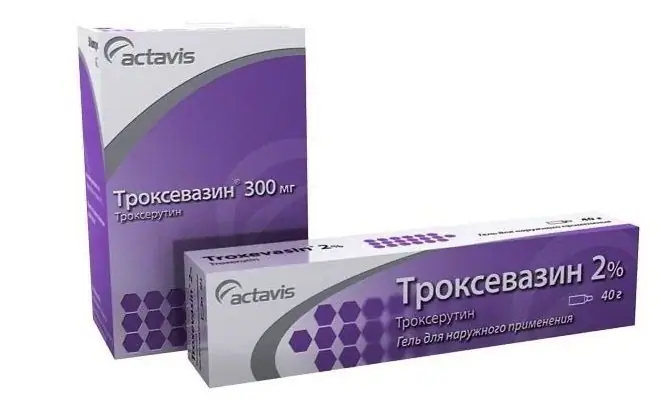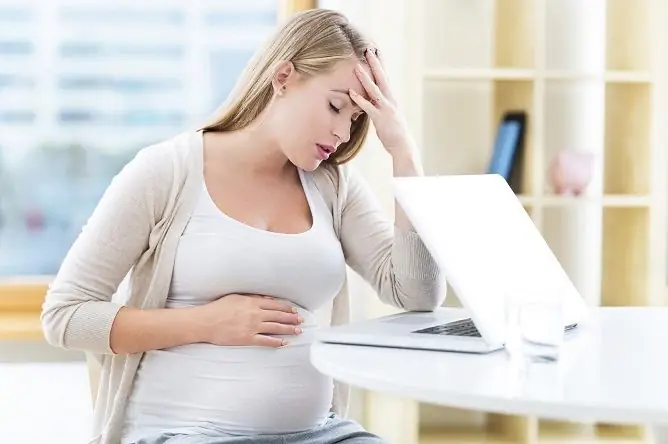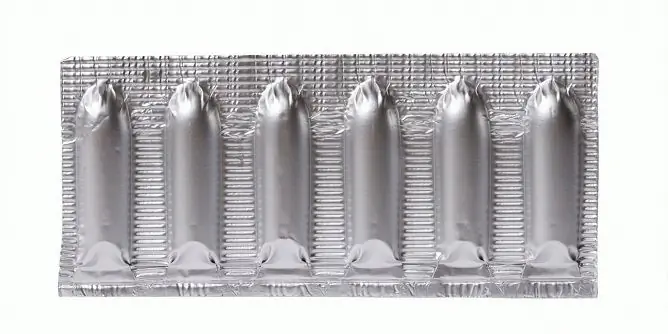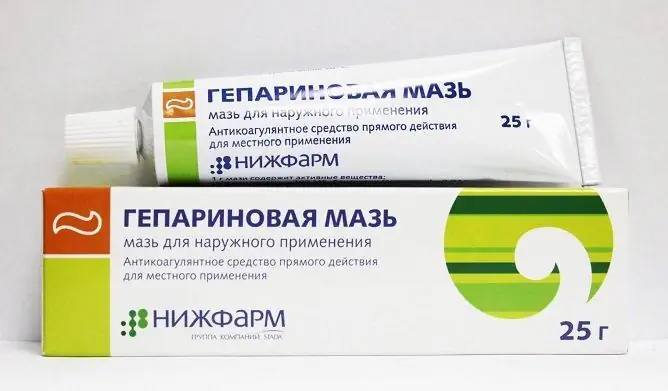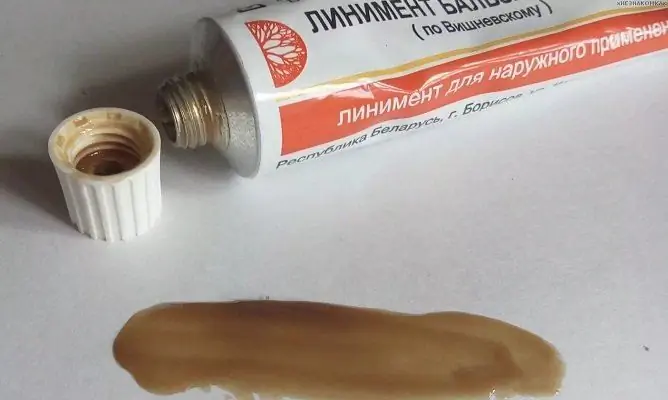- Author Rachel Wainwright wainwright@abchealthonline.com.
- Public 2023-12-15 07:39.
- Last modified 2025-11-02 20:14.
Troxevasin capsules and gel for hemorrhoids: reviews, how to use, possible side effects
The content of the article:
- The therapeutic effect of Troxevasin
- Capsules and Troxvevazin ointment for hemorrhoids: instructions for use
- Heparin ointment or Troxevasin - which is better?
- Can Troxevasin be used during pregnancy?
- Side effects and contraindications
- Hemorrhoids and principles of its treatment
Troxevasin for hemorrhoids is used for both systemic and local therapy. The drug has been used for a very long time and has established itself as an effective and reliable remedy that quickly eliminates the symptoms of the disease. However, it also has a number of side effects, as well as certain contraindications for use, so only a doctor should prescribe it.
Troxevasin is available in the form of capsules for oral administration (each capsule contains 300 mg of troxerutin) and a gel for external use with 2% troxerutin content.
The therapeutic effect of Troxevasin
The active ingredient of the drug is troxerutin, which is a semi-synthetic analogue of the natural bioflavonoid rutin, which has the following properties:
- improves blood flow through the veins;
- reduces puffiness;
- stimulates metabolic processes in soft tissues;
- suppresses the activity of the inflammatory process;
- strengthens the walls of blood vessels;
- eliminates hemorrhages.
The effectiveness of Troxevasin is significantly enhanced if it is used simultaneously with ascorbic acid (vitamin C).

In the treatment of hemorrhoids capsules and Troxevasin gel can be used simultaneously
The mechanism of the medicinal product's therapeutic action includes the following effects:
- suppression of platelet activity;
- suppression of inflammation;
- an obstacle to thrombus formation;
- improvement of microcirculation;
- decrease in the permeability of the vascular walls;
- increased vascular elasticity.
The use of Trksevazin for hemorrhoids, reviews of specialists and patients confirm this, improving the outflow of blood from hemorrhoids, contributes to their gradual resorption. The drug helps to quickly eliminate swelling, discomfort and soreness in the anus.
Capsules and Troxvevazin ointment for hemorrhoids: instructions for use
How to use the drug? Troxevasin should be taken orally, one capsule twice a day after meals. The duration of the course is determined by the attending physician.
The gel is applied to the affected area once or twice a day. After thorough toilet of the anogenital zone, a small gauze napkin lubricated with gel is applied to the area of the anus.
Speaking about how to use the drug, it should be emphasized that its effect is most fully manifested when applied simultaneously inside and outside.
Heparin ointment or Troxevasin - which is better?
In the treatment of hemorrhoids, drugs with a different mechanism of action are used. Each of them affects certain links of the pathological process, thereby eliminating certain symptoms. The main therapeutic effect of Troxevasin is provided by a direct effect on the venous wall (increasing its tone and decreasing permeability). The main component of Heparin ointment is a direct-acting anticoagulant - heparin. When using it, the risk of hemorrhoidal thrombosis is reduced by improving the rheological properties of blood, in other words, its thinning.
Thus, the question of which of these two means is better cannot be considered correct. Each of them has both its own indications and contraindications. For example, Heparin Ointment should not be used for bleeding nodes, as this will increase the intensity of bleeding. At the same time, Troxevasin, on the contrary, will strengthen the venous walls and thereby prevent hemorrhages.
Only a specialist can take into account all the features of the disease and choose the optimal treatment regimen for the patient. That is why you should not try to treat hemorrhoids yourself, based on the advice of friends who claim that they know exactly how and how to smear the nodes for their early resorption. What has helped one person can hurt another.
Can Troxevasin be used during pregnancy?
Numerous studies have not revealed the teratogenic effect of Troxevasin in hemorrhoids during pregnancy. However, in the first 12 weeks of gestation, that is, at the stage of laying the tissues and organs of the fetus, systemic use of the drug (taking capsules) is not recommended.
Starting from 13-14 weeks, if there is evidence of a pregnant woman, Troxevasin in capsules can be prescribed. The dose, frequency of administration and duration of therapy are determined by the attending physician.
Can pregnant women use Troxevasin gel against hemorrhoids? For local treatment, this form of the drug can be used at any stage of pregnancy, since it does not have a systemic effect on the body. The gel is used in pregnant women in the same way: before applying it, a woman should wash herself, then dry the skin of the perineum well with soft blotting movements; Apply a small amount of gel to a cotton pad or gauze pad and apply to the anus.
Side effects and contraindications
Troxevasin gel should not be applied to areas of the skin and mucous membranes that are damaged. It is also prohibited for use if the patient has an individual intolerance to the components of the drug.
The instruction does not prohibit local therapy with Troxevasin during pregnancy of any period. However, this fact should not be taken as an indication of the admissibility of self-medication. You should definitely visit a doctor.
Contraindications to oral administration of Troxevasin for hemorrhoids are somewhat wider. These include:
- I trimester of pregnancy;
- chronic gastritis in the acute stage;
- peptic ulcer of the stomach and duodenum;
- allergy to troxerutin.
Side effects when using the gel for hemorrhoids are rare, mainly local allergic reactions: dermatitis, urticaria, eczema.
Taking the drug in capsules can cause the following side effects:
- dyspeptic syndrome;
- exacerbation of chronic inflammatory diseases of the gastrointestinal tract;
- hot flashes to the face.
After the abolition of Troxevasin, the side effects associated with its administration quickly disappear.
Hemorrhoids and principles of its treatment
Hemorrhoids are a chronic disease, which is based on varicose veins and hyperplasia of the cavernous bodies of the end of the rectum. Pathology is widespread, in the general structure of proctological morbidity it accounts for about 40%.
Hemorrhoids cannot be viewed as a harmless disease. In the absence of the necessary therapy, it threatens the development of serious complications (inflammation, bleeding, thrombosis, necrosis of hemorrhoids), which often require surgical intervention. Regular blood loss causes anemia and associated pathologies. In this regard, the question of how to treat hemorrhoids is very relevant.
Conservative treatment includes the following areas:
- diet therapy - aimed at preventing constipation;
- the fight against hypodynamia - a sufficient level of physical activity improves the outflow of blood from the lower extremities and pelvic organs, reduces venous stasis (stasis of blood in the veins, which is the direct cause of the development of hemorrhoids);
- systemic therapy - oral administration of drugs that improve the tone of the veins, strengthen the walls of blood vessels, suppress the activity of the inflammatory process;
- local treatment (baths, suppositories, gel, ointment).
With properly selected drug treatment and lifestyle changes, which provides for the elimination of risk factors, the prognosis is favorable.
YouTube video related to the article:

Elena Minkina Doctor anesthesiologist-resuscitator About the author
Education: graduated from the Tashkent State Medical Institute, specializing in general medicine in 1991. Repeatedly passed refresher courses.
Work experience: anesthesiologist-resuscitator of the city maternity complex, resuscitator of the hemodialysis department.
Found a mistake in the text? Select it and press Ctrl + Enter.

